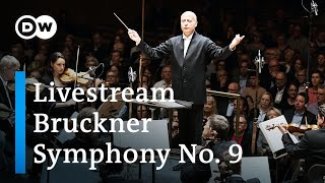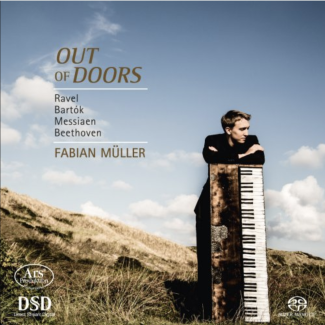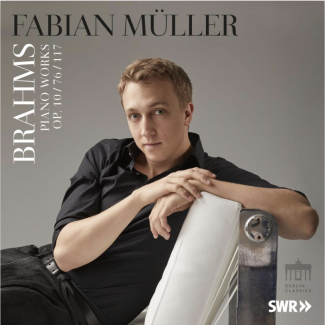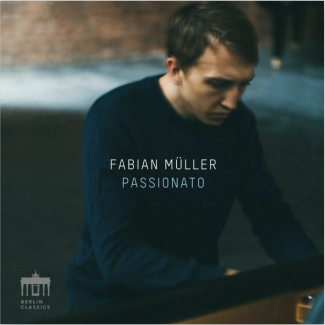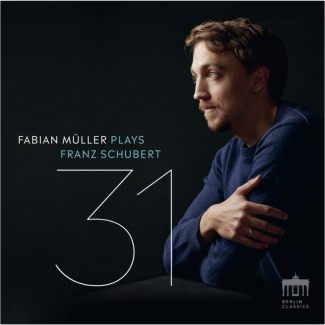



Fabian Müller
Download Assets
“Virtuoso, magnificent, excellent”
Patriot, 2023
Artist in Residence: Schwetzingen SWR Festival (season 2023/24)
In recent years, Fabian Müller has established himself as an exceptional performer, garnering widespread acclaim for his supreme talent and artistry. Highlights of recent and upcoming seasons include the cycle of all 32 of Beethoven’s Piano Sonatas in Boulez Saal in Berlin (only the second person to do so in this venue after Daniel Barenboim); collaboration with orchestras such as Die Deutsche Kammerphilharmonie Bremen (Paavo Järvi and Tarmo Peltokoski) and Deutsches Symphonie-Orchester Berlin (Maxim Emelyanychev); and his recital debut at Wigmore Hall.
Fabian Müller regularly works with orchestras such as Tonhalle Orchestra Zurich, Bavarian Radio Symphony Orchestra, Deutsches Symphonie-Orchester Berlin, WDR Symphony Orchestra Cologne, Frankfurt Radio Symphony Orchestra, SWR Symphony Orchestra, German Radio Philharmonic, Beethoven Orchestra Bonn and Deutsche Kammerphilharmonie Bremen. In spring 2018 he made his debut with Bavarian State Orchestra in New York’s Carnegie Hall and in September 2018 he performed for the first time in recital at Elbphilharmonie Hamburg.
See More
Fabian Müller is a regular guest at festivals such as Schwetzingen SWR Festival (Artist in Residence 2024), Beethovenfest Bonn (Artist in Residence 2023), Festspiele Mecklenburg-Vorpommern, Ruhr Piano Festival, Rheingau Music Festival, Festival Strings Lucerne, Heidelberg Spring, Aldeburgh Festivalas well as in halls such as Philharmonie in Berlin, Konzerthaus Berlin, Pierre Boulez Saal in Berlin, Munich Herkulessaal, Concertgebouw and Muziekgebouw in Amsterdam, Philharmonie Luxembourg National Concert Hall Dublin, Philharmonie in Cologne, Konzerthaus Dortmund, Gewandhaus Leipzig, Tonhalle Düsseldorf,Bremer Glocke and Beethovenhaus Bonn.
His active interest in the music of Johann Sebastian Bach is reflected, among other things, in a long-term collaboration with Berlin Baroque Soloists, an ensemble of Berlin Philharmonic. With Cologne Chamber Orchestra, he worked on all of Beethoven’s Piano Concertos and, conducting from the piano, performed them several times over two consecutive evenings. At Rheingau Music Festival from 2023, spread over several years, he will perform Mozart’s Piano Concertos, conducting from the piano, with the participation of Camerata Salzburg, among others.
In search of his own sound ideal, he founded his own chamber orchestra in 2023 — Trinity Sinfonia.
His musical partners include Benjamin Appl, Bomsori Kim, Liisa Randalu, Daniel Müller-Schott, Maximilian Hornung, Igor Levit, Monet Quintet, Schumann Quartet, Aris Quartet and Vision String Quartet. He first came to attention in 2013, when he made a name for himself in front of a large specialist audience when he won the International Press Prize for the best interpretation of a work by Ferruccio Busoni and the special prize for the interpretation of contemporary piano music at International Ferruccio Busoni Piano Competition in Bozen. He subsequently consolidated this in 2017 at ARD International Music Competition in Munich, where he received five prizes, including the audience prize.
In addition to his regular concert activities, Fabian Müller is also involved in the field of music education and work with children and young people. As a festival pianist at the Education Project of Ruhr Piano Festival, he works with over 300 children every year, who deal with modern music in a creative way. This project was awarded Young Ears Prize in 2014 and an Echo Klassik in 2016.
Fabian Müller has an exclusive collaboration with “Berlin Classics”. His first CD with this label was released in autumn 2018 and contains solo piano works by Johannes Brahms. Another CD with works by Beethoven, Schumann, Brahms and Rihm was released in 2020. His current album, which includes Schubert’s last three sonatas, followed in spring 2022.
Contacts
Sabine Frank Senior Director, Co-Head of Artist Management | Managing Director HP Munich | Head of International Offices Katharina Dziersk Assistant Artist Manager
Katharina Dziersk Assistant Artist Manager
general management
HarrisonParrott represents Fabian Müller for general management. We are very happy to collaborate with Markus Bröhl: Artists and Concerts for Fabian’s engagements in Germany.
Season Highlights
Konzerthalle Bamberg
Show more about Konzerthalle Bamberg
WOLFGANG AMADEUS MOZART: Concerto for Piano No. 20 in D minor, K466
He sang the theme of the Largo movement on the keys and let himself be carried away by the bubbling liveliness of the Kammerphilharmonie in the finale.”
Müller has fun. With middle voices, with melodies that he can peel out of the accompanying
undergrowth, with many small tempo shifts, above all with the sound of his instrument.”
Based on his commanding skills, his interpretation of Beethoven was clear, excellent and transparent. His playing style was natural, not overly romantic or overly sentimental, and thephrases were relaxed and at ease under the elastic rhythm. In the slow movement his touch
is light and elastic, he exudes a shimmer, and his harmony with clarinettist Matthew Hunt, who has a wonderful voice, is very touching.
Müller cultivates, on the basis of a sovereign technique, a very natural-looking Beethoven style, positively unobtrusive in its fundamental musicality, which does not romanticize and sentimentalize, which lets the phrases breathe in an always stylish rubato, fills the ornaments with substance and creates a captivating rhythmic drive
through the many sforzati.
Müller’s approach was ideal for the early C major concerto. His appropriately light touch made the work’s classical roots clear. On the other hand, he delivered the accentuated sforzati and marcato passages in a gripping manner. He thus succeeded in playing a Beethoven that was both sensitive and pointed. In the first movement, he played the longest of the three original cadenzas and structured them in an exemplary manner.
There is no need to point out the pianistic competence, which is of course at the highest level. There is no other way to do justice to Schubert in the dimensions mentioned.
40 minutes of heavy fare, in which Müller shapes a myriad of delicacies in such a way that they make the whole thing shine.
Virtuoso, magnificent, excellent
When Fabian Müller plays, he spans the musical emotional arc from quiet, fragile tones to melancholy interludes and passionate enthusiasm.
Müller also showed […] how you can conjure up the most exquisite timbres despite crystal-clear playing.
It begins with an autumnal murmur, soon shaken and torn apart by volcanic detonations, only to culminate after massive atonal layering in an ending whose iron-hard rhythms urge collection, concentration and activity: certainly lush, yet forcefully contoured, so that one
could imagine and wish for further performances.
[…] especially in Glasunov’s Variations op. 72 [Müller] showed a pronounced sense for finely differentiated valeurs and characters.
Even as a passionate concertgoer, you have to rummage very thoroughly in your memory to remember a comparably intense Appassionata.
Rihm’s dark ‘Tombeau’ does not give us these worries: here, man rages against his fate, and hardly anyone can get as beautifully angry at the grand piano as this fabulous Fabian Müller.
[…] the way he carves the Allegro of Beethoven’s Opus 57 here into the keyboard and supports the attack of the right hand with the left and the pedal in color, the way he lets the Andante con moto breathe freely, only to then bring the finale almost to bursting point with inner tension and biting contrasts and finally, in the final frenzy of the Presto, actually goes one better until you get dizzy from listening — to experience that live is yet another story.
Pianist Müller shines between the joint performances with short solo pieces. With his flowing but restrained interpretation of Debussy’s “Clair de Lune”, he delivers one of the highlights of the program.
Fabian Müller stages this stormy work with controlled furor: with all the abruptness of the fortissimo sound surfaces after a pale unison beginning, but always with an overview of the unleashed forces.
Fabian Müller, whose exquisitely delicate playing — carried by technical sovereignty and restrained musical style — cannot deny his teacher at the Cologne Musikhochschule, Pierre-Laurent Aimard, mastered the mammoth program, which was also physically exhausting, with admirable calm and balance. Thanks to the artist’s brilliant, but always work-oriented pianistic brilliance, the moving movements were given the fire they deserved — he gave the sustained ones the necessary calm and sound culture.
Indeed, he finds the color in them, with a lightness of touch and a positive disregard for certain tempos
“You rarely get such a satisfying, even exhilarating panorama of the late Schubert sonatas.”
Fabian Müller […] tended towards the big line at the concert in the cube in front of Johannisberg Castle, maintaining moderation and center. His concentration, technical ability, overview and attention to detail were admirable.
And the way Fabian Müller plays this piano — very soft, very vulnerable — it goes straight to the heart, but without opening up a big pathetic emotional box.
What Fabian Müller achieves here can be applied to the whole CD: he draws a portrait of Schubert, who can sometimes be plaintive, sometimes sad, but who wants to celebrate, drink and laugh just as passionately. He shows us a person who wants to perceive and enjoy the beauty of life in both quiet and wild moments.
A multi-layered album by a pianist from whom we can still expect a lot.
The playing […] is pianistically at a high level: the different voices are beautifully differentiated from each other in terms of colour, everything is excellently pedalized, which
ensures tonal transparency and clarity.
It is remarkable how sensitively Fabian Müller contours the expressive nuances of the music, without exaggerating anything, without toning anything down and without overdoing anything.
A great and at the same time unpretentious musician whose spirited, dedicated and sensitive playing takes the breath away and makes the Steinway shine.
To open the season, Fabian Müller and the Cologne Chamber Orchestra performed all five
piano concertos by Ludwig van Beethoven on two evenings. What the 31-year-old and the
30-strong orchestra made of these musical milestones was simply overwhelming. Fabian Müller not only took on the solo part, with stupendous technique, sparkling runs, crisp chords and beautiful lines. He also acted as conductor of the orchestra and tickled a veritable
firework of sound colors out of the orchestra, from the softest piano to the crashing forte, which caused admiration in the acoustics of the Weikersheim concert hall.
The way Müller summarizes the thoughts, holds them together, despite the jerky changes of themes, is captivatingly honest and coherent. […] Müller is a true pianist, not a dazzler. […] Brilliant in his playing, expression and sonority.
He’s a wonderfully persuasive interpreter of all four composers, fully on top of the virtuoso demands of the Schumann, always keeping the excitement of the Appassionata within musical bounds, and thrillingly dramatic in Rihm’s expressionist triptych.
“Müller acted as a welcome and necessary artistic cement between the drifting repertoire alternatives. […] All the more astonishing in view of the lack of rehearsal time was the not only technically, but also musically convincing interaction between the partners. Müller performed Runge’s rubati, for example, with somnambulistic certainty”.
“The event of the evening was the “Concord Sonata” […]. Fabian Müller threw himself into the “jumble of notes” with enormous concentration and verve and was increasingly
convincing in the flying change of quotations, inflections and the resulting fantastic musical architecture, including brief interjections of viola and flute.”
“Anyone who only comes to Husum for three days instead of the full eight must always be told by the intercontinental, knowledgeable audience that they have missed something great: this year you hear it about Fabian Müller”.




